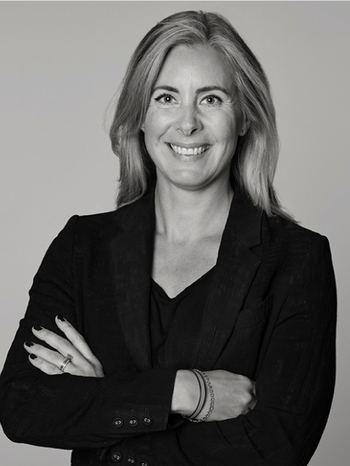Barbro Östlihn
"2-4 Ferry St. NYC"
Signed Östlihn and dated 1963. Also signed and dated verso. Oil on canvas 138 x 123.2 cm.
Alkuperä - Provenienssi
Cordier & Ekstrom, New York.
The Byron Collection, New York. Acquired from the above in 1968.
Näyttelyt
Cordier & Ekstrom, New York, November 1963.
Muut tiedot
Barbro Ostlihn and her husband Oyvind Fahlstrom arrived in New York in the autumn of 1961. Thanks to their contacts they quickly became part of the New York art scene and many of the artist friends they socialised with were associated with the Pop Art movement, such as Tom and Clare Wesselmann, Claes Oldenburg, Robert Rauschenberg and Jasper Johns.
Manhattan was undergoing a seismic transformation in the sixties and Ostlihn, energised by this metropolis, quickly discovered a way of relating artistically to the new environment. This method stayed with her throughout the fifteen years she spent in New York. As Ostlihn wandered through the city with her camera she began to document, in her stylised paintings of facades and buildings, the big city in transformation.
In November 1963 Barbro Ostlihn had a solo exhibition at Cordier & Ekstrom, the New York branch of Oyvind Fahlstrom’s Parisien gallerist Daniel Cordier. Here she displayed paintings executed between 1961 and 1963, exhibiting for the first time her facade paintings, including the painting in the auction; 2-4 Ferry St. NYC. The exhibition received a lot of attention and was written about in both the New York Times and the New York Herald Tribune.
Annika Ohrner writes in her book Barbro Ostlihn, ‘Liv och konst’ the following: “Dore Ashton described her painting in Studio International Art as a reaction against abstract expressionism’s desire for freedom. Barbro Ostlihn combines, in an unusual way, an ornamental eye for detail with the massive silhouettes of skyscrapers and bridges, Ashton states. The artist and writer Donald Judd’s review in Arts Magazine is interesting in an art historical sense. He is, for example, one of the first to point out the influence of Magritte in Ostlihn’s strict visual language. The exhibition was also appreciated and talked about in artistic circles.”
“These paintings have a conventional tone, most of the colors are muted. Magritte is a conspicuous influence. The paintings are very capable, and Ostlihn’s use of Magritte’s idea is serious. Her ingenuity is sufficient to imply that her ingenuity may become sufficient...”, writes Donald Judd in Arts Magazine, January 1964.
2-4 Ferry St. NYC fits well with Judd’s description in the review. The piece was bought from Cordier & Ekstrom in 1968 and since then it has been part of The Byron Collection, New York; not having been on the market for over fifty years.



































